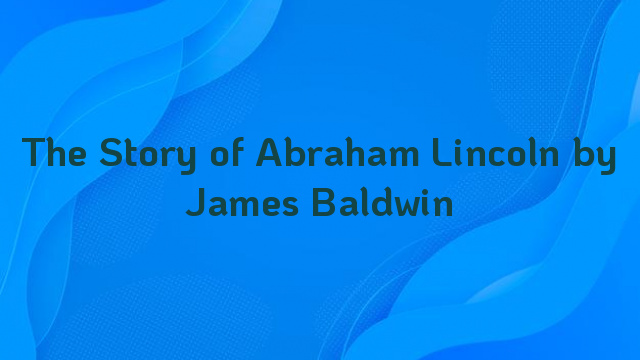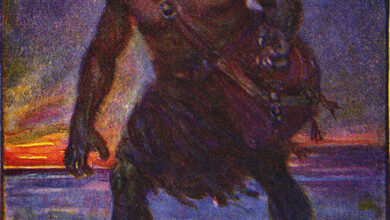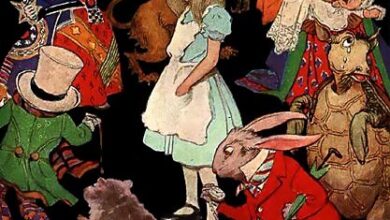
The Story of Abraham Lincoln by James Baldwin
Chapter III: The New Mother
The log house, which Abraham Lincoln called his home, was now more lonely and cheerless than before. The sunlight of his mother’s presence had gone out of it forever.
His sister Sarah, twelve years old, was the housekeeper and cook. His father had not yet found time to lay a floor in the house, or to hang a door. There were great crevices between the logs, through which the wind and the rain drifted on every stormy day. There was not much comfort in such a house.
But the lad was never idle. In the long winter days, when there was no work to be done, he spent the time in reading or in trying to improve his writing.
There were very few books in the cabins of that backwoods settlement. But if Abraham Lincoln heard of one, he could not rest till he had borrowed it and read it.
Another summer passed, and then another winter. Then, one day, Mr. Lincoln went on a visit to Kentucky, leaving his two children and their cousin, Dennis Hanks, at home to care for the house and the farm.
I do not know how long he stayed away, but it could not have been many weeks. One evening, the children were surprised to see a four-horse wagon draw up before the door.
Their father was in the wagon; and by his side was a kind-faced woman; and, sitting on the straw at the bottom of the wagon-bed, there were three well-dressed children—two girls and a boy.
And there were some grand things in the wagon, too. There were six split-bottomed chairs, a bureau with drawers, a wooden chest, and a feather bed. All these things were very wonderful to the lad and lassie who had never known the use of such luxuries.
“Abraham and Sarah,” said Mr. Lincoln, as he leaped from the wagon, “I have brought you a new mother and a new brother and two new sisters.”
The new mother greeted them very kindly, and, no doubt, looked with gentle pity upon them. They were barefooted; their scant clothing was little more than rags and tatters; they did not look much like her own happy children, whom she had cared for so well.
And now it was not long until a great change was made in the Lincoln home. A floor was laid, a door was hung, a window was made, the crevices between the logs were daubed with clay.
The house was furnished in fine style, with the chairs and the bureau and the feather bed. The kind, new mother brought sunshine and hope into the place that had once been so cheerless.
With the young lad, Dennis Hanks, there were now six children in the family. But all were treated with the same kindness; all had the same motherly care. And so, in the midst of much hard work, there were many pleasant days for them all.
Chapter IV: School and Books
Not very long after this, the people of the neighborhood made up their minds that they must have a school-house. And so, one day after harvest, the men met together and chopped down trees, and built a little low-roofed log cabin to serve for that purpose.
If you could see that cabin you would think it a queer kind of school-house. There was no floor. There was only one window, and in it were strips of greased paper pasted across, instead of glass. There were no desks, but only rough benches made of logs split in halves. In one end of the room was a huge fireplace; at the other end was the low doorway.
The first teacher was a man whose name was Azel Dorsey. The term of school was very short; for the settlers could not afford to pay him much. It was in mid-winter, for then there was no work for the big boys to do at home.
And the big boys, as well as the girls and the smaller boys, for miles around, came in to learn what they could from Azel Dorsey. The most of the children studied only spelling; but some of the larger ones learned reading and writing and arithmetic.
There were not very many scholars, for the houses in that new settlement were few and far apart. School began at an early hour in the morning, and did not close until the sun was down.
Just how Abraham Lincoln stood in his classes I do not know; but I must believe that he studied hard and did everything as well as he could. In the arithmetic which he used, he wrote these lines:
"Abraham Lincoln, His hand and pen, He will be good, But God knows when."
In a few weeks, Azel Dorsey’s school came to a close; and Abraham Lincoln was again as busy as ever about his father’s farm. After that he attended school only two or three short terms. If all his school-days were put together they would not make a twelve-month.
But he kept on reading and studying at home. His step-mother said of him: “He read everything he could lay his hands on. When he came across a passage that struck him, he would write it down on boards, if he had no paper, and keep it until he had got paper. Then he would copy it, look at it, commit it to memory, and repeat it.”
Among the books that he read were the Bible, the Pilgrims Progress, and the poems of Robert Burns. One day he walked a long distance to borrow a book of a farmer. This book was Weems’s Life of Washington. He read as much as he could while walking home.
By that time it was dark, and so he sat down by the chimney and read by firelight until bedtime. Then he took the book to bed with him in the loft, and read by the light of a tallow candle.
In an hour the candle burned out. He laid the book in a crevice between two of the logs of the cabin, so that he might begin reading again as soon as it was daylight.
But in the night a storm came up. The rain was blown in, and the book was wet through and through.
In the morning, when Abraham awoke, he saw what had happened. He dried the leaves as well as he could, and then finished reading the book.
As soon as he had eaten his breakfast, he hurried to carry the book to its owner. He explained how the accident had happened.
“Mr. Crawford,” he said, “I am willing to pay you for the book. I have no money; but, if you will let me, I will work for you until I have made its price.”
Mr. Crawford thought that the book was worth seventy-five cents, and that Abraham’s work would be worth about twenty-five cents a day. And so the lad helped the farmer gather corn for three days, and thus became the owner of the delightful book.
He read the story of Washington many times over. He carried the book with him to the field, and read it while he was following the plow.
From that time, Washington was the one great hero whom he admired. Why could not he model his own life after that of Washington? Why could not he also be a doer of great things for his country?




